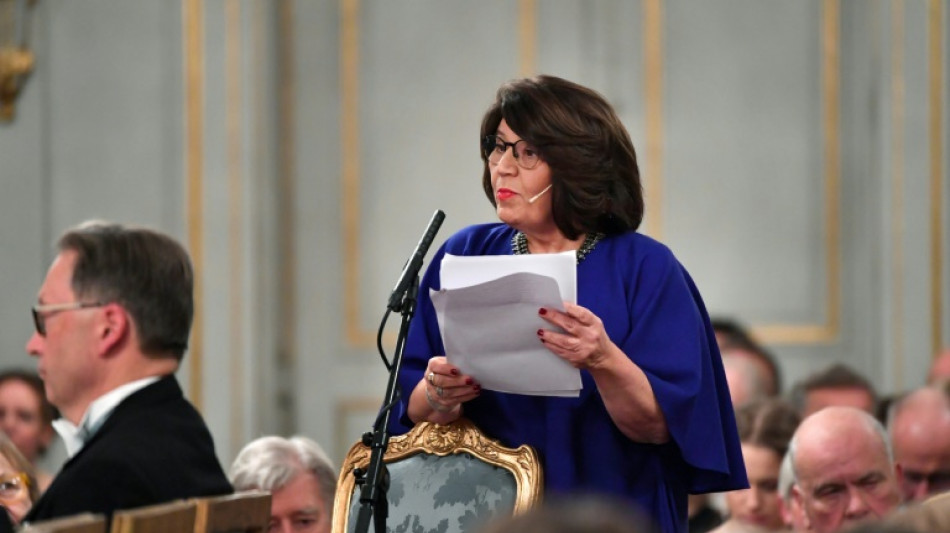
-
 Thailand votes after three leaders in two years
Thailand votes after three leaders in two years
-
Swiss joy as Von Allmen wins first gold of Winter Olympics

-
 George backs England to 'kick on' after Six Nations rout of Wales
George backs England to 'kick on' after Six Nations rout of Wales
-
Malinin upstaged as Japan keep pressure on USA in skating team event

-
 Japan's Kimura soars to Olympic gold in snowboard big air final
Japan's Kimura soars to Olympic gold in snowboard big air final
-
Vail's golden comets Vonn and Shiffrin inspire those who follow

-
 Veteran French politician loses culture post over Epstein links
Veteran French politician loses culture post over Epstein links
-
Japan's Kimura wins Olympic snowboard big air gold

-
 Arteta backs confident Gyokeres to hit 'highest level'
Arteta backs confident Gyokeres to hit 'highest level'
-
Hojlund the hero as Napoli snatch late win at Genoa

-
 England's Arundell 'frustrated' despite hat-trick in Wales romp
England's Arundell 'frustrated' despite hat-trick in Wales romp
-
Lollobrigida skates to first Italian gold of Winter Olympics on her birthday

-
 Arundell hat-trick inspires England thrashing of Wales in Six Nations opener
Arundell hat-trick inspires England thrashing of Wales in Six Nations opener
-
Chile's climate summit chief to lead plastic pollution treaty talks

-
 Rosenior hails 'unstoppable' Palmer after treble tames Wolves
Rosenior hails 'unstoppable' Palmer after treble tames Wolves
-
French ex-minister offers resignation from Paris cultural hub over Epstein links

-
 New NBA dunk contest champ assured and shooting stars return
New NBA dunk contest champ assured and shooting stars return
-
Shiffrin says will use lessons learnt from Beijing flop at 2026 Games

-
 Takaichi tipped for big win as Japan votes
Takaichi tipped for big win as Japan votes
-
Lens return top of Ligue 1 with win over Rennes

-
 Shiffrin learning from Beijing lessons ahead of Milan-Cortina bow
Shiffrin learning from Beijing lessons ahead of Milan-Cortina bow
-
Demonstrators in Berlin call for fall of Iran's Islamic republic

-
 'Free the mountains!": clashes at Milan protest over Winter Olympics
'Free the mountains!": clashes at Milan protest over Winter Olympics
-
Townsend accepts pressure will mount on him after Italy defeat

-
 BMW iX3 new style and design
BMW iX3 new style and design
-
Suryakumar's 84 leads India to opening win over USA in T20 World Cup

-
 Lollobrigida skates to first Italian gold of Milan-Cortina Games
Lollobrigida skates to first Italian gold of Milan-Cortina Games
-
Barca beat Mallorca to extend Liga lead

-
 Gyokeres lifts Arsenal nine clear as Man Utd pile pressure on Frank
Gyokeres lifts Arsenal nine clear as Man Utd pile pressure on Frank
-
Late Guirassy winner for Dortmund trims Bayern's lead atop Bundesliga

-
 'Free the mountains!": protest in Milan over Winter Olympics
'Free the mountains!": protest in Milan over Winter Olympics
-
Gyokeres double helps Arsenal stretch Premier League lead

-
 New Skoda Epiq: modern with range
New Skoda Epiq: modern with range
-
Six Nations misery for Townsend as Italy beat sorry Scotland

-
 Spain, Portugal face fresh storms, torrential rain
Spain, Portugal face fresh storms, torrential rain
-
Opinions of Zuckerberg hang over social media addiction trial jury selection

-
 Over 2,200 IS detainees transferred to Iraq from Syria: Iraqi official
Over 2,200 IS detainees transferred to Iraq from Syria: Iraqi official
-
Norway's Ruud tops Olympic men's freeski slopestyle qualifying

-
 Czech qualifier Bejlek claims first title in Abu Dhabi
Czech qualifier Bejlek claims first title in Abu Dhabi
-
French duo reach Shanghai, completing year-and-a-half walk

-
 Australian snowboarder James eyes elusive Olympic gold
Australian snowboarder James eyes elusive Olympic gold
-
Sequins and snow: Eva Adamczykova makes Olympic return

-
 Vonn set for Olympic medal bid after successful downhill training
Vonn set for Olympic medal bid after successful downhill training
-
Shepherd takes hat-trick as West Indies beat Scotland in T20 World Cup

-
 Sausages will sell after thrill-seeker Von Allmen wins Olympic downhill
Sausages will sell after thrill-seeker Von Allmen wins Olympic downhill
-
Swiss racer Von Allmen wins first gold of Winter Olympics

-
 'Wake up': Mum sparks comeback after scare for freeski star Gu
'Wake up': Mum sparks comeback after scare for freeski star Gu
-
Von Allmen wins men's Olympic downhill gold, first of Games

-
 First medals up for grabs at Winter Olympics
First medals up for grabs at Winter Olympics
-
Afghanistan captain Khan harbours dream of playing in Kabul


Jila Mossaed, from refugee poet to Swedish Academy
Jila Mossaed fled Iran for Sweden in 1986, a 38-year-old poet who spoke no Swedish. Three decades later, she became the first foreigner inducted into Sweden's highest language authority, the Swedish Academy, which awards the Nobel Prize in Literature.
Now she writes in Farsi and Swedish, but Mossaed struggled for years to learn Swedish and still stumbles over pronunciation, she told AFP in the halls of the Academy, founded in 1786 by King Gustav III to promote the Swedish language and literature.
The 76-year-old, whose work explores life, death, politics, love, exile and nature, never expected to join the Academy in 2018.
The 18 Academy members are appointed for life.
"It's such an unbelievable honour. I'm so proud of it," she said, her dark eyes beaming.
Mossaed is tight-lipped on the Nobel prize to be announced Thursday, but says she sees her Academy role in general as broadening horizons.
"I carry with me an ancient, rich language spoken by 300 million people."
"To open new windows to unknown literature and introduce it is an interesting and important contribution," she said.
In 1986, Mossaed fled Iran with her two young children after a book of her poetry received "very threatening and humiliating" criticism from the Islamic Republic's authorities.
"Soldiers came to my house with weapons and took many things," she recalled.
She was summoned to a censorship office. "When I left I thought, 'This isn't my country anymore'."
"I had no plan. I didn't know what it meant to be a refugee or which country I would end up in."
A smuggler told her Sweden and Denmark were easiest to get to.
She knew of Ingmar Bergman, August Strindberg and Pippi Longstocking, so Sweden it was.
- 'The North is my grave' -
For the first two years, she spoke only English and bought no curtains, thinking she would not stay long.
But eventually, "I realised I had to learn the language. It was hard," she said, speaking fluent but accented Swedish.
When she began writing in Swedish, "it was like there was a corpse beside me, and on it, it said 'Farsi'."
"It started gasping for air. 'I'm going to die,' it said."
"I said, 'No, don't die. I'm going to write in Farsi too, I won't forget you."
After 10 years she had written 13 poems in Swedish.
"I realised I had left my cradle and the North was my grave."
Mossaed has published 10 poetry collections in Swedish since her first book, "Månen och den eviga kon" (The Moon and the Eternal Cow), in 1997.
She insists she is still "not very good at Swedish" -- she jokes about her pronunciation and takes her time on grammar. That is unexpected for a member of an academy revered as bearers of high culture and defenders of the language.
But rather than get stuck on details, "I wanted to approach the language's soul," which she describes as "tranquility", "silence" and "nature".
"I appreciate so much that people here don't get worked up over things like religion."
- Openly critical -
Her writing changed in Sweden.
In Iran, "we're used to being put under pressure by mullahs, religion and kings, so we've always found a way to write around that."
"I didn't want to do that in Sweden, I want to be straightforward. I love the truth."
Born into a non-religious family, Mossaed is now openly critical of the Iranian government in her poetry and occasional commentaries.
"I'm glad that people now understand what it means when Islam takes power," she said, labelling the current government "brutal".
"They kill people, execute people, humiliate and whip women."
She believes the government's power is coming to an end, as Iranians "now dare to criticise and ask questions".
But "it will take time and it will be bloody. The people will pay a high price."
While her Swedish poems are "braver, politically", the language is "simpler".
When she writes in Farsi, "it's like diving into an ocean of words".
"When I write in Swedish, it's like I'm standing beside a pool."
"I'm happy that the simplicity gave me more freedom. And the critics say it's good!" she said with a laugh.
Her poems come to her suddenly, "like brain attacks", but it has been months since a poem came to her in Farsi, and she dreams and writes grocery lists in Swedish these days.
Mossaed lived in Sweden's western province of Varmland for many years. It was hard to get to know people, but she learned to love the forest.
Walking in the woods, she would reach out to touch branches.
"I said 'Taste my hand, it comes from the desert'."
"Sometimes I think the forest accepted me faster than people did."
Y.AlMasri--SF-PST



